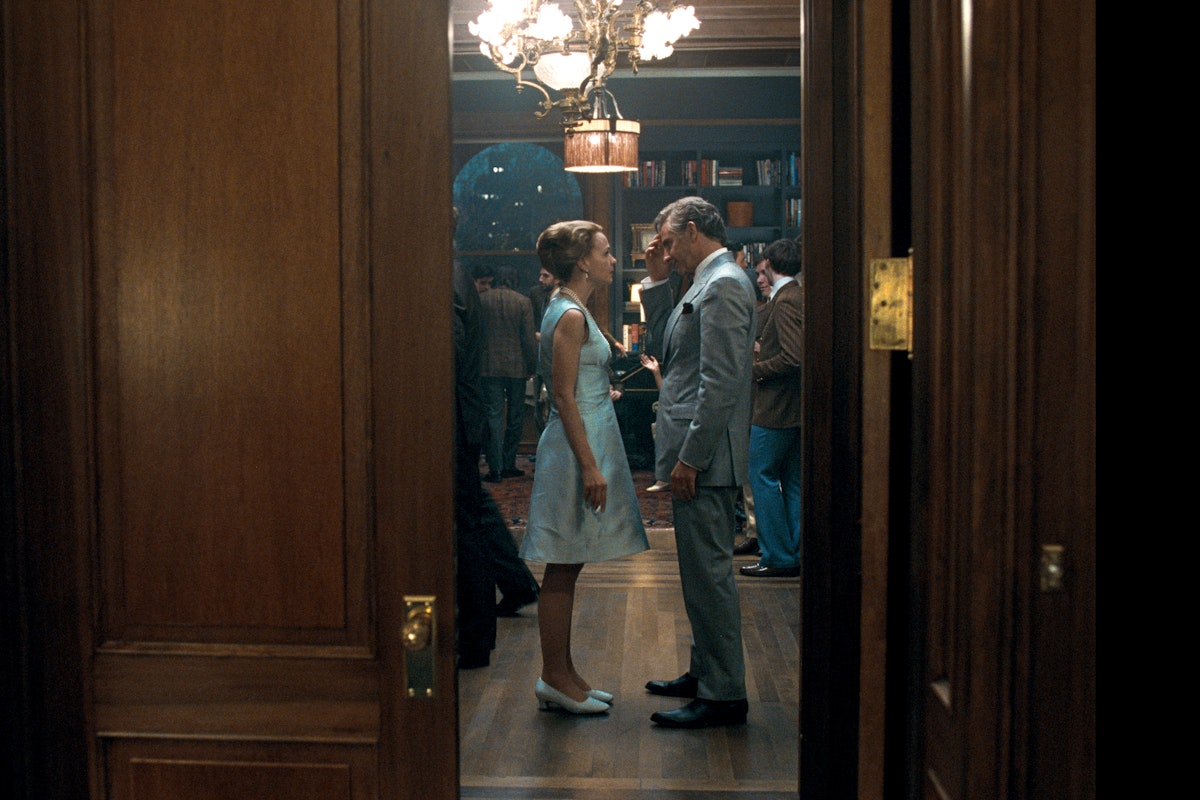
Maestro instead chooses to focus on how Bernstein’s bisexuality affected his family, and his relationship with Felicia in particular. When the film introduces young Lenny, he is in bed with a man; soon after, he meets Felicia at a party from behind the keyboard, where he seduces her to sing along. It is her 24th birthday, and this is love at first sight. Within minutes, they are talking over each other, and retreat to an empty theater where they rehearse a scene—two actors sharing a first kiss on a ghostlit stage, as if to suggest a private intimacy that is also for show. Through overwrought photography and drone shots, Cooper parallels the couple’s individual climbs to the top: Felicia bowing at the opera; the Broadway premiere of Lenny’s first musical, On the Town. Their courtship was a long one, plagued by Felicia’s misgivings about marrying a man attracted to men, but finally she relents: “I know exactly who you are,” she tells him, “Let’s give it a whirl.”
When we next see Lenny and Felicia, they have a young daughter, but before the audience has the chance to settle into this new present, Cooper skips ahead again, past West Side Story and the Young People’s Concerts to an era beset by assassinations and war, or as Lenny describes it in an interview with critic John Gruen (Josh Hamilton), a world “on the verge of a great collapse.” His marriage certainly seems to be: The liberation movements of the 1960s and 1970s threaten to make the ostensible necessity of the life that he and Felicia built appear antiquated—and yet, look at what they have. One wonders whether, had Bernstein been born a generation later, he would have heeded Copland’s recommendation, in the 1940s, to marry a “friend,” and what might have been lost as a result. (Burton reports that the elder composer retorted, upon Lenny’s urging to come out in his eighties, “I’ll think I’ll leave that to you, boy.”) When Lenny whisks Cothran away from a party at the family’s apartment in the Dakota, where Felicia catches them smooching in the hallway, we are supposed to get the sense that this happens a lot—and that Felicia resents being forced into a nagging role no less than Lenny regrets having to play it straight. But an earlier run-in with Oppenheim on Central Park West makes clear that secrecy was a career move before anything else: If the first great American conductor couldn’t be Jewish, as Koussevitsky had too pessimistically warned, he definitely couldn’t be gay.
Lenny expresses frustration over his wife’s “futility,” and although he wants to come out to his daughter Jamie, who is upset by gossip about her father’s sexuality, he is bound by Felicia’s command to “be discreet.” Marital bickering crescendos to a separation, abbreviated by Felicia’s cancer diagnosis and the couple’s reconciliation. In spite of his misgivings, Bernstein was foremost a husband and father, Cooper and his children would like us to understand: He wanted it all, but he loved Felicia truly and was not above doing the right thing.